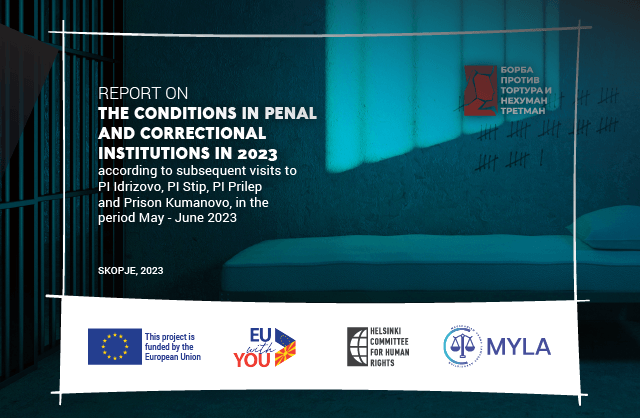REPORT ON CONDITIONS AND CONDITIONS IN PENAL AND CORRECTIONAL INSTITUTIONS IN 2023

This report was prepared within the framework of the project “Fight against torture and inhumane treatment”, financially supported by the European Union. For the purposes of the project, a Memorandum of Cooperation was concluded between the Helsinki Committee for Human Rights, the Macedonian Young Lawyers Association and the Administration for the Execution of Sanctions.
In the period from May to June 2023, four consecutive visits were carried out in PI Idrizovo, PI Stip, PI Prilep and PI Kumanovo, in accordance with the assessment of the team working on the project. The selection of penitentiary institutions is due to the perceived conditions for the accommodation of convicted persons ascertained during regular visits, but also to the numerous indications and petitions submitted by the convicted persons to the Helsinki Committee for Human Rights.
The findings in this report are based on the data obtained from the visits carried out by the monitoring team, which inspected the premises of the penitentiary institutions, provided free legal assistance, conducted conversations with almost all the directors of the institutions, as well as with the employees from among members of the prison police, social workers, psychologists, lawyers, etc.
It was noted that, despite many commitments by the state, international and domestic organizations to improve conditions in penitentiary institutions, systemic deficiencies still exist. It is obvious that there is a lack of appropriate intersectoral cooperation between the competent institutions, which is key to solving the problems faced by persons deprived of liberty in these institutions. It is precisely because of this that penitentiaries fail in fulfilling their legal obligations to overcome the problems that have been going on for a long time and make it impossible for convicted persons to enjoy their rights and resocialize themselves.
Convicted persons do not have adequate access to health care, nor adequate material living conditions, and resocialization programs, conditions for their implementation and post-penal assistance are still insufficient and inapplicable. At the same time, during this period there was an increase in the dissatisfaction of the members of the prison police, who pointed out that their security was violated and that they were facing a serious problem due to the increasing number of pressures and threats to them personally, but also to their families and loved ones.
Corruption continues to be a serious problem in institutions, which the convicted persons regularly inform us about. But for fear of losing their rights and conveniences, they do not want to formally report these cases. In addition, what was noticed, and what is particularly worrying, is the small number of appeals submitted by convicted persons for the decisions made on the imposition of disciplinary measures. The practice shows cases when the convicted persons did not receive the decisions on imposing a disciplinary measure. For example, if they are in solitary confinement, the solution is attached to the door of the solitary confinement, and convicted persons manage to get in touch with an NGO, lawyer and/or lawyer after they finish serving the disciplinary measure. All institutions do not respect the regular formal procedure for imposing disciplinary measures, so in some cases no decision has even been made to impose a disciplinary measure.
As a positive practice, it can be noted that in some penitentiary institutions, efforts are being made to establish resocialization measures and activities, vocational activities, as well as increased work engagement of convicted persons.
Overcrowding, especially in PI Idrizovo, where the largest number of convicted persons are located, most of whom are a security risk, is an alarming problem for which the state must urgently find a solution. Only by solving this systemic problem can we expect the realization of resocialization as one of the main goals of the prison sentence and the reduction of the crime rate in the country. In recent years, there has been an increase in the number of probation cases and cases for which an alternative sentence has been imposed, which is certainly one of the positive examples of solving the long-term problem of overcrowding in penitentiary institutions and promoting the resocialization and reintegration of convicted persons.
For this purpose, civil society organizations will closely monitor the implementation of the National Strategy for the Development of the Penitentiary System in the Republic of North Macedonia 2021-2025, as well as the Strategy for the Development of the Probation Service in the Republic of North Macedonia 2021-2025. With the implementation of these strategies , we expect the correct application of the legal and by-law regulations, improvement of the conditions and the situation in prisons, but also strengthening of the capacity and professionalism of the employed staff, as well as increased supervision over the operation of the penitentiary institutions, and at the same time, the improvement of the probation system



